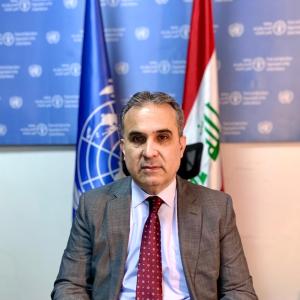FAO’s Efforts with Partners to Address the Challenges of Climate Change through the Implementation of the Farmer Field Schools Approach and Women's Empowerment Initiatives in Central and Southern
28 January 2024
Najaf, January 28, 2024 – The Food and Agriculture Organization of the United Nations (FAO) in collaboration, with the Ministries of Agriculture, Environment, Water Resources, and other governmental partners, is leading transformative projects in Southern Iraq. These projects ", funded by the Swedish International Development Cooperation Agency (SIDA), and by the Canadian government, aim to improve agricultural practices and empower farmers and women to drive positive change.

A key component of these projects is the implementation of Farmer Field Schools, and the Climate Wise Women approaches. To this end, FAO in collaboration with the Ministry of Agriculture, conducted a five-day Training of Facilitators (ToF) workshop in Najaf. brought together 24 participants from the governorates of Najaf, Babel, Wasit, and Diwaniyah.
This initiative aims to encourage farmers to adopt Good Agricultural and Irrigation practices, including Sustainable Land Management and Conservation Agriculture, through the implementation of Farmer Field Schools by trained facilitators on the targeted crops in the governorates.
During the training workshop, specific sessions were dedicated to discussing the importance of women's involvement and its crucial role in achieving goals. Special recognition was given to the Food and Agriculture Organization (FAO) for its efforts in promoting women's engagement through initiatives related to food security, nutrition, and rural livelihoods.
The workshop included a field training day in Al-Abasiyah district, with primary focus on demonstrating sustainable agricultural practices, improved irrigation methods, and crop management strategies. The facilitators conducted assessments encompassing crop conditions, irrigation efficiency, pest management, and fertilizer application through the Agro-Ecosystems Analysis tool.
The training workshop was concluded with a closing ceremony attended by, Dr. Mithaq Al-Khafaji, the Technical Deputy of the Ministry of Agriculture, representing HE Dr. Abbas Jabr Al-Mliki, the Minister of Agriculture; FAO Representative in Iraq, Dr. Salah El-Hajj Hassan; Mr. Munim Shahid Hussein, Director of Najaf Agriculture; Dr. Hadi Hashim Al-Yasiri, Director-General of the Horticulture Department; Mr. Munir Ali Karidi, Director-General of the Agricultural Extension Department; Dr. Ayad Al-Bolani, Director- General of the Agricultural Investment Department; and other high-ranking officials from the Ministry of Agriculture.
In his closing remarks Dr. Salah El Hajj Hassan expressed that these initiatives go along with agricultural development plans and priorities, promoting sustainable food systems and building resilient communities with an emphasis on empowering women and implementing climate resilience practices.
Dr. Mithaq Al-Khafaji, expressed gratitude to FAO for the valuable training that enhanced facilitators' capabilities in promoting sustainable agricultural and irrigation practices through the Farmer Field School approach, while also empowering rural women communities, representing significant milestones toward achieving our objectives in environmental sustainability.
This initiative aligns with various Sustainable Development Goals (SDGs), including SDG 2 (Zero Hunger), SDG 5 (Gender Equality), SDG 6 (Clean Water and Sanitation), SDG13 (Climate Action), and SDG 17 (Partnerships for the Goals).
For more information, please contact:
Reem Al-Sadoon, Communications Assistant: reem.alsadoon@fao.org
Salah El Hajj Hassan, FAO Representative in Iraq : salah.elhajjhassan@fao.org

He started his career in 1984, as Senior Research Assistant in the Agricultural Research and Education Centre (AREC), American University of Beirut. From 1987 to 1991, he was Coordinator of the Student Training Programme, and also Agriculture and Horticultural Teacher for the Faculty of Agriculture, at the Lebanese University.
From 1991 to 1995, he worked as Agricultural Engineer at the Ministry of Agriculture, Bekaa Regional Office, Zahlah and was then assigned to the Agricultural Research Institute in the Tal Amara station, first as Head of the Crop Production Department and subsequently in charge of the Plant Protection Laboratory. From 2002 to 2006, he was Director of the Kfardane Research Station (Agricultural Research Institute). In 2008, he became Visiting Scientist at the International Maize and Wheat Improvement Centre (CIMMYT) and Coordinator of a project with the International Centre for Atomic Energy Agency, Vienna.
In 2010, he served as Advisor to the Minister for Agriculture of Lebanon. In 2011, he became President of the Pesticide Scientific Committee, Head of the Phytoplasma Committee and Director of the Agriculture and Rural Development Programme (ARDP) (EU-funded project). From 2010 to 2013, he represented Lebanon in negotiations with EU, Egypt, Jordan and Iraq. During his career, Mr Hajj Hassan also carried out a number of other functions. He represented the Lebanese Agricultural Research Institute (LARI) in several research programmes with the International Centre for Agricultural Research in the Dry Areas (ICARDA) and the American University of Beirut. He was Coordinator of the Mashreq/Maghreb project with ICARDA, representing Lebanon in the Steering Committee, as well as being the Head of the Sugar-beet Delivery and of the Wheat Delivery Committees. For a number of years, Mr Hajj Hassan worked for the preparation of FAO TCP projects and served as the National Director of a TCP project. He joined FAO in January 2014 as FAO Representative in Yemen. Mr Hajj Hassan succeeds Mr El Zubi as FAO Representative in Iraq.



